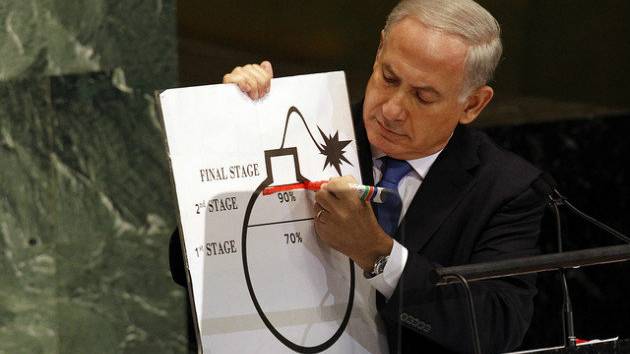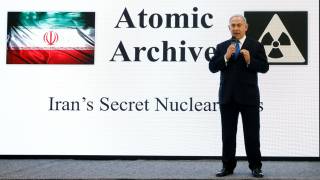Nuclear Weapons. Who Needs “Red Lines”: Iran or Israel?
Source: globalresearch.ca

In his September 23, 2012 speech at the United Nations General Assembly, Israeli Prime Minister Benjamin Netanyahu asked the United States and its allies to define clear red lines for the Iranian nuclear program, emphasizing that Iran will reach the threshold at which it could manufacture a nuclear bomb by mid 2013. A deep scrutiny of the past and of present events and trends tells a different story.
After Iraq’s defeat in the 1990 war in Kuwait, Israeli officials focused on the Iranian nuclear program as the main threat to Israel security. At first they alleged that Iran had bought nuclear weapon components from the former Soviet Republics. Then they put aside that argument and stressed that Iran was seeking to acquire nuclear weapons, and would reach that target within a few years and requested that the U.S. and EU to do everything possible to prevent Tehran from achieving that goal. Israel had sufficient influence in the U.S. to see sanctions imposed on the Iranian oil industry in mid the 1990s. But European powers that were tired of following the U.S. and Israeli lead after the end of the Cold War were not prepared to accept these arguments. They improved their relations with Tehran and consequently the attempt to apply U.S. laws regarding Iran extraterritorially failed.
However, the Israeli lobby succeeded in convincing the U.S. of the threat posed by Iraq. Sanctions and military attacks against Iraq continued until that country was invaded by a U.S.-UK arranged coalition in 2003. During the presidency of G.W. Bush, Israel benefited from the support of Neoconservatives who held high office in his administration. Tel Aviv put aside the peace process and launched military attacks against Lebanon in 2006, Syria in 2007 and Gaza in 2009. Israel also encouraged the U.S. to put increased military and economic pressure on Iran. To satisfy Israel, the Bush administration undermined the “EU3’s” negotiations with Tehran, and constantly emphasized that “all options were on the table”[1]. However, the U.S. administration was hamstrung, because of the situation in Iraq and Afghanistan. Finally, realities weakened the Neoconservatives and brought Realists back to power in Washington. The bipartisan Iraqi Study Group recommended negotiation with Iran to stabilize Iraq.
The Bush administration found a clever method by which to deflect Israeli pressure and Neoconservative rhetoric. After years of emphasizing that “all options were on the table,” the administration had two options- either: (i) to implement their threats or (ii) to take the military option off of the table. The U.S. also gradually began to feel the economic consequences of the wars in Afghanistan and Iraq at home and was therefore not able to launch another war. President Bush did not change his position but the U.S. intelligence agencies rather acted to remove the urgency of the Iranian threat. In 2007 the U.S. intelligence community published a National Intelligence Estimate (NIE) that assessed that Iran had halted its nuclear weapons program in 2003. The NIE paved the way for the U.S. to negotiate with Tehran in Baghdad and to join in the nuclear negotiations with Tehran.
The U.S. intelligence community’s position on Iran’s nuclear program has not changed. Moreover, the current positions of Iran and the U.S. are compatible with one another. The U.S. emphasizes that Iran be prohibited from acquiring nuclear weapons, while Iran emphasizes its right as a signatory of the Non-Proliferation Treaty (NPT) to enrich nuclear fuel. The NPT accommodates both of these sets of interests. Consequently Iran and the U.S. have a common basis for negotiation.
During the Bush administration, the Israeli lobby in the United States succeeded in imposing a red line on U.S. conservative establishment policy that was illegal under international law. And that was to insist that no enrichment take place in Iran. The Obama administration changed this redline to one compliant with international law, whereby Iran not be permitted to acquire nuclear weapons. The swap agreement [2] that was proposed and then rejected by the U.S. included tacit agreement to the idea that nuclear fuel could continue to be enriched in Iran. In the recent nuclear negotiations with Iran that took place in Istanbul, Baghdad and Moscow, the EU3+3 have also tacitly accepted that the enrichment of nuclear fuel in Iran can continue; the negotiators have asked that Tehran refrain from enriching nuclear fuel up to the twenty percent purity level—even though such enrichment is legal under the International law.
The Israeli position continues to differ from that of the U.S. and the EU3+3. Tel Aviv emphasizes denying nuclear technology to Iran, but its main target is actually to weaken Iran irrespective of the state of Iran’s nuclear program. Israel’s main problem is not with Iran but with its immediate neighbors. Tel Aviv has lost its control over its neighborhood and cannot influence the situation there. At a minimum, Israel feels besieged by new, unknown forces. By emphasizing the Iranian nuclear issue Israel is pursuing two goals: (i) to create a new (Iranian-Israeli) conflict so that (ii) the world forgets the old (Arab-Israeli) one.
Due to the fact that Arab governments are concerned about the Iranian nuclear program and Iranian regional influence, Israel has somehow been able to create a loose Arab-Israeli alliance against Iran. We should not forget that Arabs did not condemn the Israeli military actions against Lebanon in 2006 and Hamas in 2009. Saudi Arabia and Qatar are more concerned about Iran than about Israel. The Syrian conflict and Saudi-Qatari support for extremists there demonstrate this very clearly. The question is, if the extremists succeed in Syria, who will their next targets be? Iraq, Israel, Jordan, Saudi Arabia or the U.S.? This is why the U.S. and EU are hesitant about intervening in Syria.
What Israel fears most is not Iran but being left to its own devices by the West in an instable region. For the first time, Israel really feels isolated in the region. Because of their internal economic problems, the EU and the U.S. are not capable of defending Israel by going to war. Israel has lost both its supremacy in the region and the commitment of its allies. What Israel is seeking to achieve is to keep the U.S. and EU engaged in the region by maneuvering them into launching another war. For Israel, the costs of the war and the degree of success it achieves are secondary issues. The main objective is a long-term U.S. and EU commitment and involvement in the conflict on Israel’s side.
Israeli security is important for the U.S. and EU but not more important than their own interests. The U.S. knows very well that, if the Israelis attack Iran, the U.S. has no option but join them. If they do so, however, they will not be able to defend their own interests. The U.S. has great military power, but many vulnerable interests as well. The EU’s vulnerabilities are even more pronounced than those of the U.S. Consequently, long-term conflict in the Middle East will be too costly for the U.S. and EU to tolerate.
Iranian behavior during the past decade demonstrates that Tehran is not seeking nuclear weapons. By implementing the Additional Protocol to the NPT from 2003 to 2005 and by subsequently resolving outstanding issues with the IAEA, Iran demonstrated that its nuclear program is peaceful. Iran’s religious leader has issued a fatwa against the acquisition of nuclear weapons as a clear demonstration of Iran’s future intentions. This fatwa has the capacity to prevent the proliferation of Weapons of Mass Destruction (WMD) in Muslim countries and to prevent the use of such a weapons by Islamic groups.
After years of intervention, sanctions, political pressure, covert warfare and cyber- attacks, Iran has much more reason to be concerned about the real intentions of Israel, the U.S. and its allies than the latter have to be concerned about those of Iran. A nuclear capacity has simply provided a minor form of reinsurance of Iran’s security; it does not deter any attack on Iran. But those who intend to attack Iran, should think twice or more. Iranians have now understood the importance attached to such a nuclear capacity in U.S. and Israeli military calculations. This shows that a peaceful nuclear capacity can also contribute to peace and stability—it is not even necessary to have nuclear weapons in order to deter rational enemies.
If we compare the behavior of Iranian and Israeli leaders, we can easily conclude that Iranian behavior has been much more rational. Voluntary cooperation with the International Atomic Energy Agency, implementation of the modality agreement, acceptance of the swap proposal, cooperation and negotiation with the U.S. to bring peace and stability to Iraq and Afghanistan are all clear indicators of rational behavior in Tehran. If any of the Western countries had faced the threats and pressures that Iran faces, they would surely have behaved differently. Israel will not be able to achieve sustainable peace by force in the new Middle East. Regional concerns about Iran’s nuclear program can be solved through regional security dialogue. Iran has always supported bilateral and multilateral dialogue with neighboring countries.
[...]
Read the full article at: globalresearch.ca






















